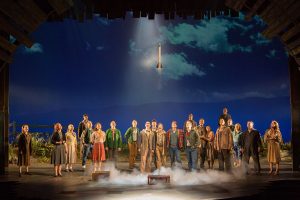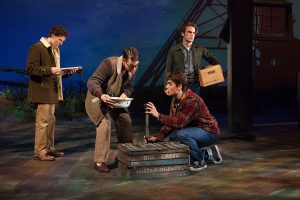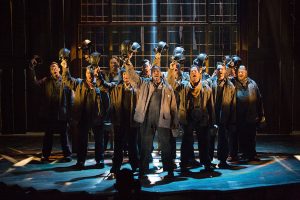‘October Sky’ Leads From Coal Mines to Outer Space in Globe Musical
Two mainstream modern myths are harnessed in tandem for October Sky, a new musical at the Old Globe Theatre based on Rocket Boys, the autobiography of Homer Hickam, a boy from Coalwood, in West Virginia coal country, who became a NASA engineer and successful author.
One of the root tales here is particularly American: Ambition plus hard work equals success. The other is more recent and universal: How are we coping with the end of the Industrial Age?

The community of Coalwood, W. Va., enters the Space Race in October Sky, now at the the Old Globe Theatre. Jim Cox Photo
Brian Hill and Aaron Thielen adapted Hickam’s story from the book and from the 1999 film, also titled October Sky. The likeable score is by Michael Mahler. All three seem to have agreed on a strong, simple, earnest framework for an uplifting feel-gooder. But they’ve hugged and cuddled and underlined the story right to the edge of banality.
Homer is introduced as a nice, dreamy kid who languishes in the shadow of his high-school football hero older brother, clearly favored by their rugged, straight-arrow Dad, who has worked his way into the foreman’s job (and responsibilities) at the mine.
Homer wants out of his hometown, but he’s not sure of where or how to go. Then, the world is changed forever when Soviet Russia launches Sputnik, the first manmade punch into space. A visionary science teacher works on her herd of hormone-driven pupils to stress the importance of the occasion but Homer is the one who connects. Suddenly, he sees the future and his place in it. He’ll build rockets!
Although he can barely add a column of figures, he gathers his buddies (not the most popular kids but certainly the most likeable and probably the brightest), insists they add the school’s hopeless nerd outsider and finds a magazine on making rockets.

Austyn Myers, Connor Russell, Kyle Selig and Patrick Rooney in October Sky at the Old Globe Theatre. Jim Cox Photo
Their first try blows up his Mom’s picket fence and brings stern disapproval from Dad and general ridicule from the rest of Coalwood. But the guys persevere, with help from a serious rocket-building textbook the teacher provides and the off-hour skills of a Polish immigrant machinist at the mine.
Under Homer’s leadership, real progress seems possible. The failures get more impressive and the first glimmers of respect appear. The teacher starts talking about science fairs with scholarships as prizes.
Homer’s Dad, however, is not buying it. Loud explosions are problems in mining towns so Homer (and the helpful machinist) have to go into sneak mode. And, when the older brother gets a football scholarship to the university (and is whisked away like chattel), Homer must step up and become the son who perpetuates the family mining tradition.
The story thereafter drops into a predictable groove. Only the obstacles and goals are different from recent sagas of bootmakers, ballet dancers, marching bands, male strippers and such. It’s possible to fail in this sort of story, if enough hope remains, but it’s not the popular path. And this is a show that craves your attention.
At times, Hill and Thielen seem to be stuck in some narrative loop. Points made are remade and resolved conflicts ravel again for no apparent reason. Though their own dreams are vivid, the women must rue their fate to always wait in fear of the perils underground and the pressures brought back by the men. We got it the first time around.
Other matters remain unclear, like why is Dad so determined the family must have a next generation down in the hole, earning the lung disease that already has him coughing?

Sandra DeNise, Kerry O’Malley and Eliza Palasz, left to right, in October Sky at the Old Globe. Jim Cox Photo
Mahler’s songs are pleasant and obvious with considerable “june/moon” type rhyming and scant illuminating information. They certainly are urged upon the audience: seven of them are reprised, one twice. And they fall into the pattern of everybody getting to explain themselves. Keeping score seems irresistible. Dad couldn’t convince me but Mom did. Mom, the teacher and Homer’s wistful girlfriend have the best explainer. Homer’s are lame.
And there are some opportunistic numbers, too. When the boys decide to try alcohol in their fuel mix, they go to the local moonshiner. Instead of filling their fuel tanks, though, they start drinking the stuff themselves, and a wholesale hoe-down, complete with eccentric dances and a jug band, ensures. We never do find out if the fuel works but we do meet a lively slice of the band, which otherwise mostly suggests the outlines of an orchestral approach demanded by the score.
Rachel Rockwell has staged the show with a comfortable fuzz over reality that’s easy to embrace. Even when they’re only sketched, the characters seem to have stories outside the play. It’s a large cast than easily could be even larger but Rockwell handles every scene, and the transitions between, with graceful confidence and ensemble spirit.
Kyle Selig as Homer is an endearing pilgrim, a natural leader and a good listener. Everybody wants a Mom as warm as Kerry O’Malley, a teacher as sharp as Sandra DeNise, and pals as supportive as Austin Myers and Patrick Rooney. And think how every sissy high school outcast would love to be the comeback kid played here by Connor Russell, who might steal the show if it were less dense and busy.
The most complex role in the play, Homer’s father, is played with rugged, manly grit by Ron Bohmer, who never quite makes his case despite heavy artistic lifting. Some roles are nearly impossible for authors to lift out of real life.
The massive Kevin Depinet weathered wood and cruel steel basic set allows convincing textures for Japhy Weideman’s lighting, which ranges from poster push to sentimental and painterly (check that trio “The Last Kiss Goodbye”.) They also frame effectively the cool bucolic hills of West Virginia and the vast living skies so brilliantly delivered by Shawn Sagady’s projections. Linda Cho’s costumes include no compromises for the place and time and the rocket shots, among Markus Maurette’s special effects, are great fun.
It takes a village, true, but when the principal of the school tells his teachers, “The only need enough education to keep from bumping their heads in the mine,” we know that villages can be anchors, too.
Yet Homer really did make it out. And, while there’s no report on everybody else in Coalwood, except for the occasional tragic news story of another mining disaster, the formula of ambition plus hard work equals success remains in effect.
(Continues in the Old Globe Theatre at 7 pm. Tuesdays, Wednesdays and Sundays; at 8 p.m. Thursdays-Saturdays; and at 2 p.m. Saturdays and Sundays through Oct. 23, 2016.)

Welton Jones has been following entertainment and the arts around for years, writing about them. Thirty-five of those years were spent at the UNION-TRIBUNE, the last decade was with SANDIEGO.COM.




